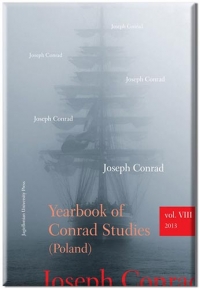STERNNESS AS A SOURCE OF LEVITY IN JOSEPH CONRAD, JAMES M. BARRIE, AND CHARLES DICKENS
STERNNESS AS A SOURCE OF LEVITY IN JOSEPH CONRAD, JAMES M. BARRIE, AND CHARLES DICKENS
Author(s): Keith J. ZukasSubject(s): Comparative Study of Literature, Polish Literature, Other Language Literature, Theory of Literature
Published by: Wydawnictwo Uniwersytetu Jagiellońskiego
Keywords: Joseph Conrad; Charles Dickens; James M. Barrie; “The Tale”; sternness; characterization; irony; humor;
Summary/Abstract: It is a small but important feature of Conrad’s work that “sternness” as a character trait is almost never used to build the atmosphere that its definition of strictness and severity suggests. Instead, acting sternly tends to undercut the authority and sense of personal awareness of characters who attempt it, often contributing to moments of levity or outright comic relief. Conrad was not alone in this use of sternness but, like his contemporary Barrie, he absorbed it from Victorian writers, including Dickens, whose work he read and admired. This paper traces the uses of sternness through Conrad’s canon, showing how its manifestations help to create Conrad’s singular sense of humor. Special attention is paid to the use of the word “sternly” in the last line of “The Tale,” where its interpretation is critical to readerly projections of the story’s future action. Selections from Dickens and Barrie are also discussed in order to contextualize and illuminate Conrad’s own uses of sternness.
Journal: Yearbook of Conrad Studies (Poland)
- Issue Year: 2017
- Issue No: XII
- Page Range: 173-182
- Page Count: 10
- Language: English

